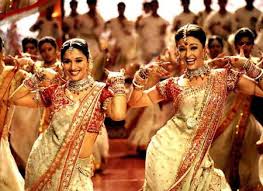It's a Bollywood Life
 Dear Friends,
When I was a little girl, we would often drive long distances for our vacations. We drove from the Midwest to California, to Florida, and to New York. On those long drives, I would stare out the window watching houses go by and wonder about the people who lived in those houses.
Dear Friends,
When I was a little girl, we would often drive long distances for our vacations. We drove from the Midwest to California, to Florida, and to New York. On those long drives, I would stare out the window watching houses go by and wonder about the people who lived in those houses.
I wondered whether there were kids living there. And I wondered whether they, like me, ate macaroni and cheese. Did they go to school? Did they visit their Grandma's house on Sundays? They could even be sick with the flu right now, while I was driving by! Sometimes we would see kids swimming in a pool or playing in a yard. And I realized that they were immersed in their own lives, and didn't know that I was going by. They didn't even know that my family, along with my Grandma and Uncle Dick, were driving all the way to Disneyland in California. That surprised and intrigued me.
Recently I listened to a talk by meditation teacher Sylvia Boorstein on YouTube. She was describing a practice she uses each time she teaches. She looks around the room and thinks to herself: of the 30 people here, at least one of them has a diagnosis of something serious, at least one has a problem with employment, and one probably has an elderly mother or father that they are taking care of.
"Everybody here has a life... I don't know whose story is whose, but everybody here, just like me, would like to be happy." -- Sylvia Boorstein
I realized that what I was doing in the car in the 1970s was very similar to the practice Sylvia's described. And it reminded me of a teaching I heard long ago-- that we normally see life as a movie in which we have the starring role. We think that everything that happens around us is about us. When we watch a movie, like say Breakfast at Tiffany's, every scene is meaningful only in reference to how it impacts Holly Golightly. This is true in most movies with a main character, and is generally true in our own lives. Every event we witness bears meaning only insofar as it impacts us, or by extension our beloved people, animals, plants or land. This seems to be part of our human conditioning.
It can be an illuminating practice to look at other people with the awareness that they are responding to life as if they were the star in their own movie. Whenever events occur, other people reference them to themselves, even as we reference them to ourselves. If we want to practice understanding other people, we can start right there. It may be shocking to realize that we are not the star in their movie. They are. Next time you are at the grocery store, look at the cashier, and think about his or her inner movie -- the one in which he is the star. You are an extra in his movie, you might not even get a credit. Try this with anyone and everyone you meet. You may find it quite interesting and even life changing.
Funnily enough, each of our movies has similar plot lines. Just like in the cinema, in all our movies, the star is trying to find happiness, health, love and acceptance, and wants everyone they love to be have the same. Our daily life experiences may be different, but our underlying story lines are the same.
Of course there is no real movie, but knowing that we all star in our own movies can build in us a deeper understanding that leads to empathy and love. Instead of believing that our movie is the truth, we can see that everyone's movie seems like the truth to them. When we look at people around us, we can become curious: Has this person been disappointed today? Are they celebrating something joyful? Did they sleep poorly? Do they like macaroni and cheese? What scene is running in their movie right now? We may not have had anything to do with what they are experiencing, but by stepping out of our own movie, we begin to see the true nature of the world, rather than simply our own limited frame.
Instead of a drama with us as the leading lady or man, maybe this is a Bollywood dance number and each of us is simply one of the many chorus line women or men singing and dancing together. Practicing like this doesn't mean we give up taking responsibility for our own lives and our own loved ones. We just start to see how we could connect more and find more joy by letting go of the belief that we are the lead and everyone else is supporting us. We all do this. And we all really just want happiness. And it may be that we find more happiness sharing the stage with this whole motley ensemble, than we find isolating ourselves as the star.
